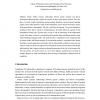440 search results - page 60 / 88 » A knowledge hierarchy model for adaptive multi-agent systems |
ECAL
2007
Springer
13 years 11 months ago
2007
Springer
odel of Embodiment on Abstract Systems: from Hierarchy to Heterarchy Kohei Nakajima, Soya Shinkai, Takashi Ikegami A Behavior-Based Model of the Hydra, Phylum Cnidaria Malin Aktius...
25
Voted
ICCSA
2005
Springer
14 years 1 months ago
2005
Springer
Genetic Studies examine relationships between genetic variation and disease development. Pharmacogenetics studies the responses to drugs against genetic variation. These two lines ...
ATAL
2009
Springer
14 years 2 months ago
2009
Springer
This paper argues that the agent-based simulation approach is just the one appropriate to the social sciences (including economics). Although there were many predecessor approache...
KRMED
2008
13 years 9 months ago
2008
SNOMED CT (SCT) has been designed and implemented in an era when health computer systems generally required terminology representations in the form of singular precoordinated conc...
PVM
2009
Springer
14 years 2 months ago
2009
Springer
Abstract. Most parallel systems on which MPI is used are now hierarchical: some processors are much closer to others in terms of interconnect performance. One of the most common su...

